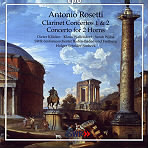As recent recordings on Teldec and Chandos have shown, Antonio Rosetti was a marvelous composer with a fresh, original classical style. Although he used the Italianized version of his name, he was Czech, which is practically a guarantee of superior musical quality, especially in the treatment of wind instruments. These three concertos, two for clarinet and one for two horns, offer eloquent testimony to his high powers of invention and consummate craftsmanship. Rosetti wrote on an expansive scale: all three works feature fully developed opening movements, and the slow movements of the clarinet concertos, both subtitled “Romanze”, boast a lyric beauty worthy of Mozart. Toss a couple of folk-inspired rondo finales into the mix, and the result is thoroughly winning. The performers seem to be enjoying themselves immensely. Clarinetist Dieter Klöcker in particular deserves credit for reviving so much unknown wind music of the classical period. A friend of mine remarked recently that he was surprised at just how good the music of some of the “other” classical composers (i.e. not Haydn and Mozart) really is. He was right, and here’s further proof.
































